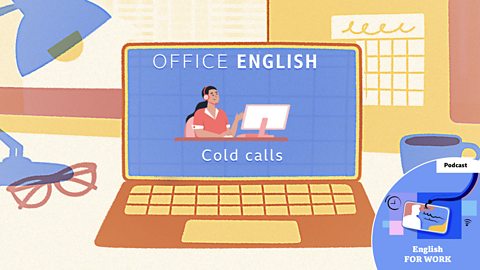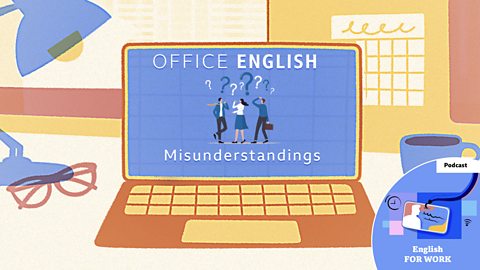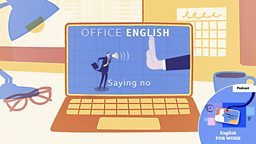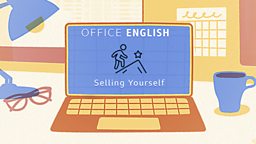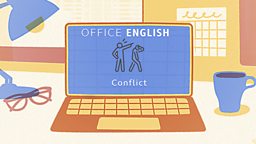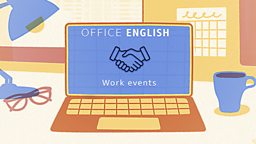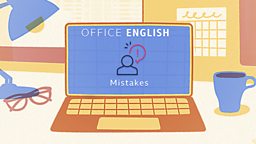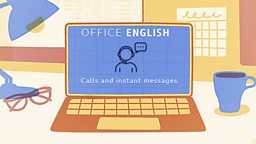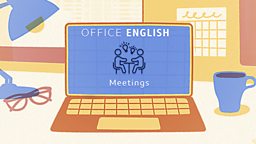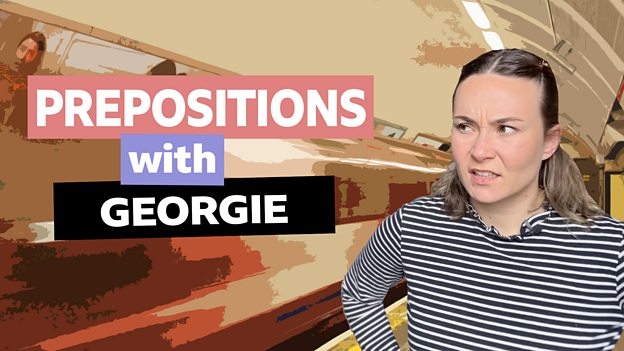Office English
Upper intermediate level
Cold calls
Episode 250505 / 05 May 2025

Image: Getty
Introduction
Do you ever have to call or email people you don't know at work? In this episode of Office English, Pippa and Phil talk about cold calling and building relationships with new people at work.
TRANSCRIPT
Note: This is a transcript of a spoken conversation and is not a word-for-word script.
Pippa
Do you ever have to call or email people you don't know at work?
Andrew
That can be a little bit daunting, especially when you don't know how busy they are. I always try and be quite positive and overly polite. If they do respond in a way which is like annoyed, then that's on them. It's not on there.
Georgie
I really hate having phone calls, especially when it's out of the blue and you haven't prepared or you don't know what they're going to say.
Phil
Today on Office English, we're talking about the language to use with strangers at work.
Pippa
Hello and welcome to Office English. In this series, we talk about the words and phrases you need to work well in English. I’m Pippa.
Phil
And I'm Phil. You can find a transcript for this episode and all the language we discuss on our website, bbclearningenglish.com.
Pippa
We heard from BBC Learning English colleagues at the start of the programme that calling or emailing people you don't know can be difficult. How do you find it, Phil?
Phil
Yeah, it can be difficult, especially phoning people, I think.
Pippa
Yeah, I think phoning is much more difficult than emailing. I'm OK if I email someone that I've never emailed before, because you can prepare and you can write it out nicely. But I find the idea of speaking to someone on the phone, especially somebody that I want something from, really difficult because you can't really practise too much. You don't know what they're going to say.
Phil
Having said that, when I do it, it's usually much easier than I ever thought it was going to be. It's usually fine.
Pippa
We often say on this programme that you should listen to people around you in your office to help you know what's the right way to speak, and that's much harder when you're speaking to somebody from another business or somebody from your company that you've never met, because you don't have that model of what's the right way to speak with them.
Phil
Today we're going to talk about the idea of cold calling. This is where you contact somebody you don't know in order to try and do business with them. People do this for all sorts of reasons. It might be to try and sell something, or it might be to develop a partnership.
Pippa
Yes, and if you’re cold calling in the modern workplace, that might literally mean to call them or you might email them. We'll talk about both and how to stay polite and professional.
OK, let's start with contacting someone for the first time. Are there some ways we can do this which will mean we give a good impression to the person we're calling, Phil?
Phil
I think if you're calling someone, you need to get all the important information across fairly quickly because you're taking some of their time and they're probably not going to give much up. So make sure that you've got the right person and you might need to find a different person if you haven't. Introduce yourself. Say, ‘I'm, I'm Phil and I work at BBC Learning English’. Check whether they've got time. ‘Is now a good moment to talk?’ And then explain the reason why you're calling in a short sentence. So you might say something like, ‘I'm calling to see if you'd be interested in working with us on an upcoming project’.
Pippa
Yes, and similar things apply if you're emailing somebody for the first time. But I guess you don't have to worry so much about whether it's a good moment for them because they'll open their email when they're ready. It's not quite as instant as the phone call. You want to introduce yourself and what you want quite succinctly. You want to not send them a really long email that they won't read, but you need to ask them a clear question. So you could just say, ‘is this something you'd be interested in?’ So make sure they've got something to respond to from your email. And then what you could do once you've clearly stated what it is that you want, is you could offer a follow up call. So you could say something like, ‘if so, perhaps we could book in a quick call to talk more’. And so you're then able to give them more detail on the phone.
Phil
OK. So in that first call you've made the first contact. Now what you can get from that first contact might depend a lot on the culture of the company that you're calling, how your companies work together. There's a lot of factors in it. So you might need to think about what are you realistically aiming to get in that first call?
Pippa
Right. So hopefully we've made a successful first contact with somebody. How might we build this relationship, Phil? How might we sort of build upon that first call or email?
Phil
Well, it will depend on what you want from the person you're contacting. Often you're trying to convince them to do something or to buy something. So you might want to try and find out what they think about something.’ What are your thoughts on this? or ‘are there any sticking points?’ that means anything that's difficult that you might need to work through? You might want to ask, ‘what do you need for this to work?’
Pippa
Yeah, I think that's a good idea, because sometimes if you're trying to persuade someone to do something, it can feel a bit pushy. But if you're asking them more about, you know what, what do they need to know from you? What are they interested in? Then it's less about being pushy and kind of persuasive, and more about getting a sense of what they want. You can also check in regularly, so if you have a call or an email and then you don't hear from them, you want to kind of keep the conversation going. So you could maybe send an email and say ‘where are we at with this?’ It just means, you know, have we made any progress? Or you could ask, ‘do we have any movement?’ That means have they sort of changed their mind at all or come to any decision. Another phrase I'd use a lot in an email is saying, ‘just following up to see if you'd had a chance to consider this’. So it's just politely reminding them about what you've been discussing.
Phil
And always keep in mind what you want to get from it. So when you can try to bring the conversation back to the thing you asked about when you first made contact. So it could be really informal. It could just be something like, ‘so, have I convinced you? What's the verdict?’ Which basically means what do you think?
Pippa
Yeah. Or you could be more formal. So if you have a more formal relationship with this person, you could say something like, ‘so would you like to work together on this?’ Some… Sometimes you can talk to people for a long, long time, and it's helpful to have a point at which you want to kind of get a yes or a no and not talk to them forever. But it will depend, as you say, on the kind of working culture, whether you work somewhere where it's important to build up a relationship over a long time, or whether you work somewhere where people like to make decisions a bit quicker.
Phil
We've talked about phone calls and emails, but is one better than the other? Let's hear again from our BBC colleagues.
Andrew
That can be a little bit daunting, especially when you don't know how busy they are.
Georgie
I don't mind a phone call if we've arranged it in advance, and I feel kind of prepared for what's going to happen and maybe write some notes, write some questions, maybe, that I would ask. That helps you to feel prepared.
Pippa
So Georgie mentioned not liking talking on the phone, particularly if the call isn't planned. And we talked about that at the start of the program. What do you think, Phil, though, do you think sometimes you do just need to call somebody?
Phil
Of course it depends on the context. A lot of people don't like cold calls, so if you call someone on their personal phone, they might just not pick up or they might not have time to talk to you. It might not be a good moment. But if you're looking at a company and they've got a web page saying ‘please call us on...’ they're kind of expecting you to call. So it might actually be the best way to get something sorted quickly.
Pippa
Yeah. And if you just send an email that can be slower and it could be ignored by somebody. So you're not kind of definitely going to speak to them if you send an email, and they might just not be sure about what you've said, and then they forget to reply. And so you could try a combination of email and phone calls, as we mentioned earlier. So people might respond, well, if you sort of email them, set up a phone call. And then when they're speaking to you on the phone, they've definitely got the time to speak. They're in the right frame of mind. They've maybe thought about your idea in advance. And so they're ready with their questions. And yes, it does really depend on the context of what you want from someone who they are, how long it will take to sort out what you need to organise. Sometimes a phone call is much quicker and you can just organise everything in one conversation. But sometimes when you're building relationships, you need kind of multiple emails, multiple calls as well.
Phil
That's it for this episode of Office English. For more tips for your English at work, visit bbclearningenglish.com. And send us your questions about Business English. You can email us on learningenglish@bbc.co.uk.
Pippa
Next time we'll talk about giving feedback at work. See you then, bye.
Phil
Bye.
Now try this...
English for job applications

